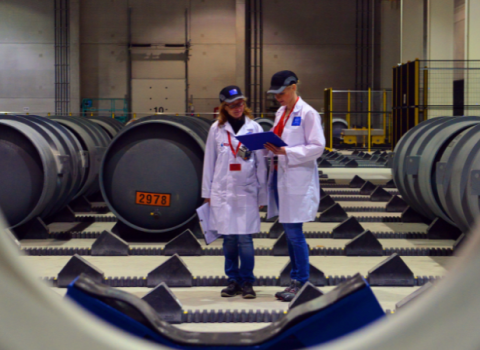Sponsored by EIT InnoEnergy
Investment, training, regulation and more are needed to get new climate solutions into use fast, experts say

Adel El Gammal, secretary general of the European Energy Research Association. Photo: Lysiane Pons, Science|Business
By now, most people know global warming is an urgent crisis needing urgent action – but actually mobilising the needed investment, technology and policies is no small task.
At a Science|Business conference in Brussels 10 September, energy experts urged smart action now to get new technologies to market. “Under current emission levels we will have emitted enough green house gases in 10 years to overshoot the 2°C target, with catastrophic consequences, and under current policies, we are on a pathway to reach at least 3.5 °C warming by end of the century,” warned Adel El Gammal, secretary general of the European Energy Research Association.
“Our focus and priority must be investment now and rapid deployment of the full range of options and technological solutions available, appropriate to the location and season, to slow down the rise in temperatures and reverse the curve,” he said. “We need a strategy for emerging technologies if we want to decarbonise in 30 years.”
Agreed Tudor Constantinescu, principal adviser in the European Commission’s energy directorate-general, there is no simple solution to the decarbonisation challenge. The list of problems is long. These range from “what kind of regulatory and policy framework do we need for sectorial integration? to, ‘how can we ensure our investment continues to deliver in 20 or 30 years?’” He said “only a coordinated approach to research and investment that includes member states and consumers can deliver decarbonisation targets.”
And there is no lack of new ideas needing development. For instance, El Gammal urged closer attention be paid to “reverse solar” systems, which generate power at night when the sun goes down, or “negative emissions” technologies that remove carbon dioxide from the air. “These don’t exist yet so we need to invest massively now or it will be too late. And we need to look beyond Europe.”
The importance of partnerships in taking innovation to market was highlighted by Gilles Badot, a division head at the European Investment Bank. For instance, the EIB can provide funding for projects while the Commission acts as guarantor. That means the EIB can carry risk that other banks won’t, he said. As an example, he cited the first floating wind farm under construction in Portugal. The EIB provided €16 million for this technology now attracting investment from other countries, including France.
A key venture in that project is Principle Power, set up in 2007 and supported by the EIB, the Commission, and EIT InnoEnergy, a big energy-innovation community that is part of the European Institute of Innovation and Technology. After 12 years of effort, said Nailia Dindarova of Principle Power, they are now commercialising their technology internationally - a clear demonstration of the need for a coordinated and long-term approach. Without it, this technology could never have been on the market, she said. The InnoEnergy support included a range of services, from finance to provision of internships to attract young talent.
Guillaume Gillet, InnoEnergy’s EU business unit director, said his organisation helps start-ups “pass through the valley of death” – the position of a new company when its technology is so new that no one wants to invest and it’s too early for other investors such as venture capitalists or the EIB to come in. It provides funding and services to help ventures scale up. There are successes and sometimes failures from which we learn. “You can’t have innovation without failure,” he said.
But along with money and guidance, regulatory changes are also needed if these new technologies are to take off. As an example, Bertrand Deprez, vice president for European affairs at Schneider Electric, cited the case of microgrids, small networks of power generators that can operate in isolation from national grids, or in tandem with them – a development thought to provide greater flexibility in electricity management. This requires regulation to encourage its spread.
Deprez also emphasised the importance of value chains and people in finding solutions for decarbonisation. This means “massive investment in skills” as well as risky business investments needing, as in the case of electric vehicles, incentives to attract consumers.
Editor's note: This story was corrected on 26 September to clarify Adel El Gammal’s statement on the current trajectory of global warming.





 A unique international forum for public research organisations and companies to connect their external engagement with strategic interests around their R&D system.
A unique international forum for public research organisations and companies to connect their external engagement with strategic interests around their R&D system.